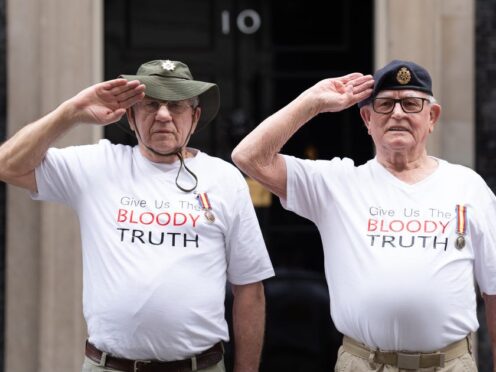
Military veterans who took part in nuclear weapons tests have offered to settle their legal claims with the Ministry of Defence through a “special tribunal” following attempts to gain access to medical records they claim have been illegally withheld.
Veterans and their next-of-kin served a “letter before action” on the Ministry of Defence (MoD) on Tuesday – setting out the details of their claims.
Some of the claimants said they have had cancer, blood disorders and lost children – and descendants have spoken of being born with obvious disabilities.
According to the MoD, more than 20,000 military personnel were present at the UK nuclear weapon tests between 1952 and 1967 in Australia and the South Pacific.
Veterans handed in a petition at Downing Street on Tuesday, and made an offer to resolve their claim through the creation of a “special tribunal” in order to settle the matter “efficiently, and quickly”.
The claimants believe a special tribunal would be a fast-track method of investigating, compensating and commemorating alleged victims.
The MoD previously said “it remains the case that no information is withheld from veterans” but could not comment on ongoing litigation or claims.
As part of the legal claim, veterans have said blood and urine samples taken at the Cold War weapons trials have been reclassified as “scientific data” and placed at the Atomic Weapons Establishment – an agency of the MoD – which means they cannot be accessed.
Sources at the MoD said the archives at the Atomic Weapons Establishment have been searched on numerous occasions and do not contain the medical records of service personnel.
Brian Unthank, of Erith, Kent, said he had 92 skin cancers removed, lost 13 children to miscarriage and 20 years of his annual medical records are missing.
He said: “I am one of the lucky ones. I am 86, still here and still fighting.
“I was proud to serve my country, and it saddens me that I am now forced to serve it again with a legal action.
“The Prime Minister refused to talk to us, and the Veterans’ Minister told us to sue.
“We only want the bloody truth.”
Nuclear veteran descendant Alan Owen, and founder of campaign group LABRATS, said: “The youngest survivors are now in their mid-80s, and they’ve seen other injustices – like Hillsborough, infected blood, and the Post Office – grind on for decades, at huge cost to everyone.
“That’s why our legal team has made an offer to the MoD to settle this efficiently, and quickly. No-one can afford to wait any longer.”
Veterans have campaigned for years over illnesses they say were caused by radiation exposure, in a fight which reached the Supreme Court in 2012, where 1,011 test cases lost their bid to be allowed to seek compensation.
The claimants say they can prove the nuclear testing was repeatedly ordered over a 10-year period and up to 100% of personnel at some operations were affected.
Veterans also claim ministers have repeatedly misled Parliament and that they blocked information being given to next-of-kin in 2022.
It is also claimed military medical files have been edited to remove all records from their time at the tests, making it difficult to claim war pensions on the basis of radiation-related injury.

Jason McCue, senior partner at McCue Jury & Partners, which is representing the veterans and their families, said: “Be it Hillsborough, Infected Blood or the Post Office, time and again we have seen injustices left to fester.
“This stops now. The veterans’ case is strong, fair and simple.
“It is sad that the MoD cannot see what is as plain as a pike staff to everyone else and that it requires court action to force it to take responsibility.”
A crowd-funding page has been launched to support the veterans’ legal claim at crowdjustice.com/case/nuclear-veterans-case.
A spokeswoman for the MoD said: “We are grateful to all service personnel who participated in the British nuclear testing programme and contributed to keeping our nation secure and are pleased that they have received a medal in recognition.
“Nuclear test veterans who believe they have suffered ill health due to service have the right to apply for no-fault compensation under the War Pensions Scheme.
“It remains the case that no information is withheld from veterans and any medical records taken either before, during or after participation in the UK nuclear weapon tests are held in individual military medical records in the government’s archives, which can be accessed on request.”

Enjoy the convenience of having The Sunday Post delivered as a digital ePaper straight to your smartphone, tablet or computer.
Subscribe for only £5.49 a month and enjoy all the benefits of the printed paper as a digital replica.
Subscribe